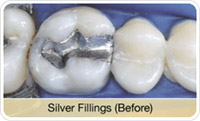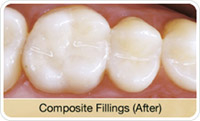The clear alternative to traditional mercury fillings.


A composite filling is a tooth colored quartz-like material. After tooth decay is removed and cleaned, this tooth colored material is layered into the tooth. Each layer is hardened or cured with highly intense visible light, and the final surface is shaped and polished to match the tooth. The final restoration is virtually invisible.
Composite fillings are more than just attractive. They are environmentally non-toxic because they use no mercury. They are stronger because they bond directly to the surface of the tooth. They protect the tooth from fracturing because they don't require the severe "undercut" (removal of healthy tooth structure) of a mercury filling.
The initial investment in a composite filling is higher than that for a mercury filling. This is due to the fact that the composite material is more expensive and the restoration is more difficult and time consuming to place. However, this initial higher investment is offset in the long run by the health benefits and reduced likelihood of restoring potentially fractured teeth.
Inlays/onlays are sometimes good alternatives to composite fillings, offering excellent long term durability. In cases of extensive decay, inlays/onlays or crowns are the only alternative